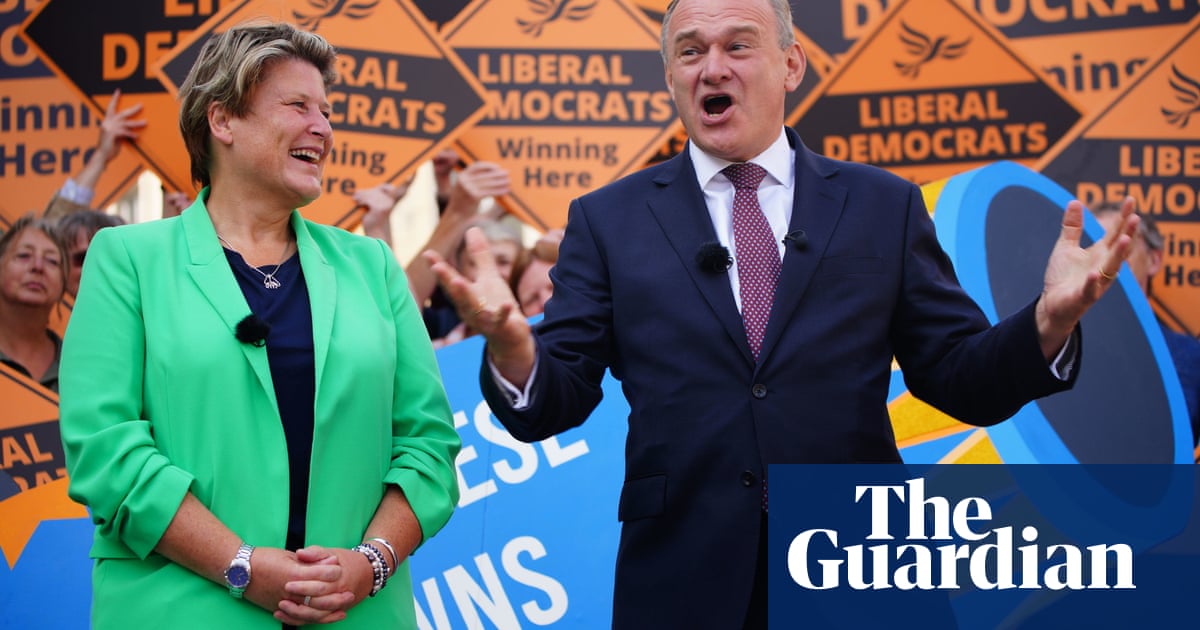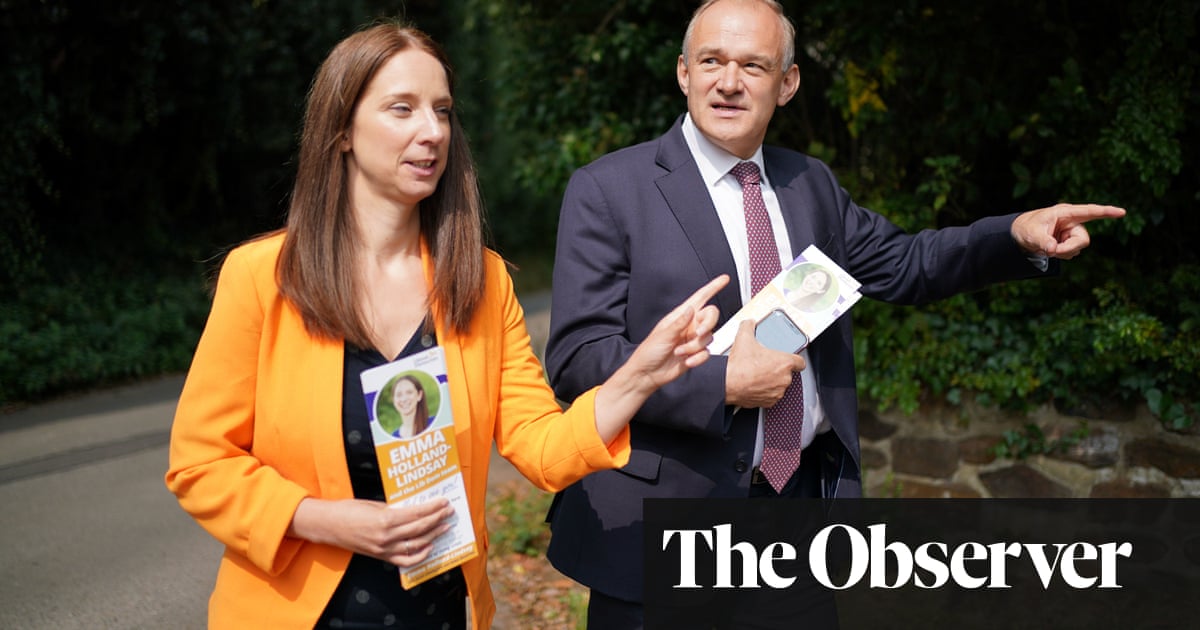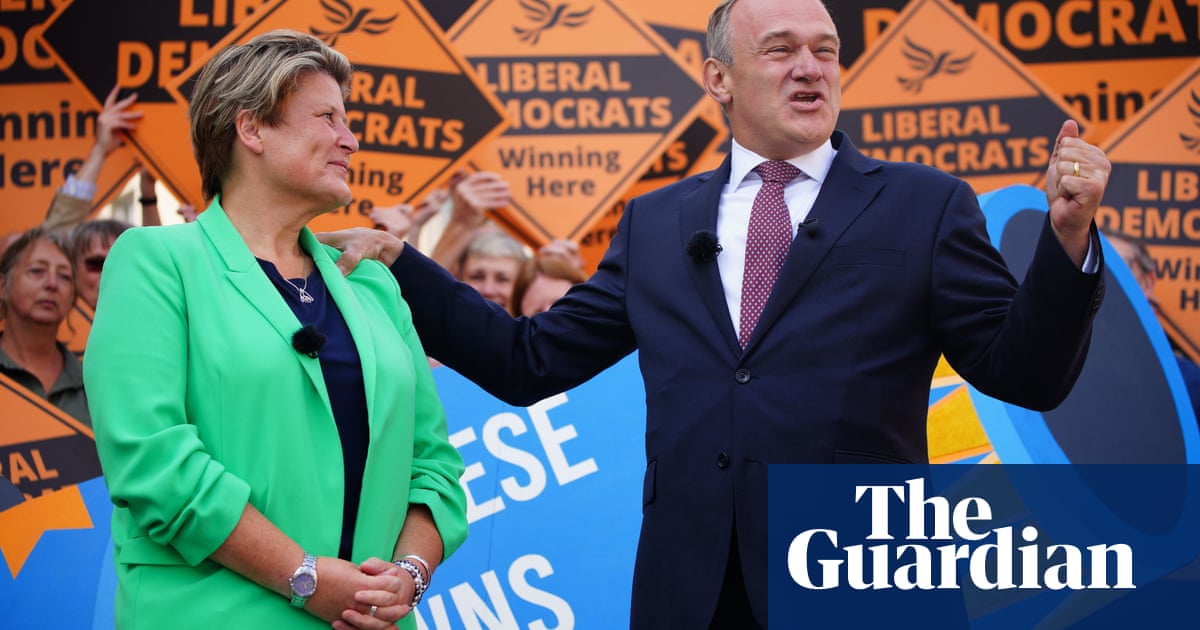
Surrounded by a bobbing sea of orange placards, the Liberal Democrat leader, Ed Davey, gleefully popped his head around a bright blue door emblazoned with the slogan “It’s time to show Boris the door”.
The Lib Dems have always loved a cheeky byelection photocall, but this one on Friday morning was particularly sweet after their extraordinary victory in the rural constituency of Tiverton and Honiton – a third political earthquake after Chesham and Amersham a year ago and North Shropshire in December.
David McCobb, the Lib Dem director of field campaigns, said Thursday’s win had come thanks to going door to door, listening to people’s concerns and explaining how the party would make things better.
“Yesterday alone we had over 20,000 conversations with people in the constituency. We were switching votes to us right up to the time of the poll. The south-west has a long Lib Dem tradition – what you’re seeing here is a swing back to the Lib Dems.”
On tactical voting, he said: “Clearly here a load of Labour supporters lent their vote to the Lib Dems. There are many seats where we have the best chance of beating the Conservatives. In those seats voters will vote pragmatically. People will vote for the party that can beat the Conservatives.”
He named Wimbledon, Woking, Wokingham and South Cambridgeshire as places where the Lib Dems expected to do well at the next general election.
On the day before polling day alone, party activists hand-delivered more than 40,000 leaflets, more or less equal to the number of people who went to the polls. Over the course of the campaign the party sent out an estimated 750,000 pieces of campaign paper, almost 10 for every potential voter.
Hannah Kitching, a councillor in Barnsley, has travelled to Devon twice, spending a week each time in the constituency, to help campaign. Explaining why she had not gone to Wakefield, which is much closer, she said: “All parties want to pile their resources into where they can win. Our best chance of unseating a Conservative MP was to put our resources into Devon. The Labour party thought their best chance was to put their resources into Wakefield.”
In Tiverton and Honiton the Lib Dems focused not just on national problems – and Boris Johnson – but on issues that are keenly felt in the south-west in particular, such as long ambulance waiting times and the struggle to find an NHS dentist.
Christine Jardine, the Liberal Democrat MP for Edinburgh West and the party’s Treasury spokesperson, flagged this up at the declaration: “The farmers and pensioners feel let down, families are squeezed, people are afraid that if they have an accident there will not be an ambulance, and they cannot get a dentist. All these things contributed.”
The Lib Dems were much more visible than the Tories in Tiverton and Honiton. On one sunny Friday at the height of the campaign, Davey was to be found walking up and down Honiton high street, having spent the morning testing the quality of river water in Axminster. On the same day, by way of contrast, Johnson made a flying visit to a farm behind closed doors, dodging reporters, TV crews and voters hoping for a glimpse and a chat.
Patrick English, an associate director of the pollster YouGov, said: “The result in Tiverton and Honiton shows just how far the disaffection and frustration with the Conservatives goes – namely, right into their south-western heartlands. We can’t tell for sure from the aggregate data, but with around 72% of voters who went to the polls in 2019 returning again today, the size of the swing between the Conservatives and the Liberal Democrats suggests a high number of voters switching directly between the two parties.
“This was not simply a ‘Tory voters staying at home’ story. The collapse in the Conservative vote share, down by 22 points, should set off alarm bells right across the region. Even in the safest of leave-voting rural Conservative seats, the party is losing and is losing big.”
English said that across the south-west of England sat a raft of sparsely populated, ageing, Brexiter constituencies held by the Conservatives since at least 2015, when a blue sea swept the region, propelling David Cameron to a Westminster majority.
Hannah Bunting, an expert in public trust in politicians from the University of Exeter, said: “This sends a signal about people’s views on the government’s behaviour and actions. Conservatives planning for future national elections would be foolish not to take note. When we look at all the byelections of this parliament and current polling figures, the government may be in for the biggest electoral fall from grace we’ve seen in a long time.”
She pointed out that Tiverton and Honiton was not really best thought of as part of the “blue wall” – the string of Conservative seats in affluent commuter belt areas already seen as vulnerable to a Lib Dem incursion.
“This result is a signal to the Tories that they could be fighting the next election on three fronts in England: on the red wall, the blue wall and seats like this in the south-west which are very different,” she said. “If we really want to name them, perhaps they will be the ‘yellow hedge’. These seats have a strong history of liberalism. Voters are pragmatic but not too tribal. They care deeply about local issues and where they live, and they often judge their elected representatives on how much they deliver for the local area.”












